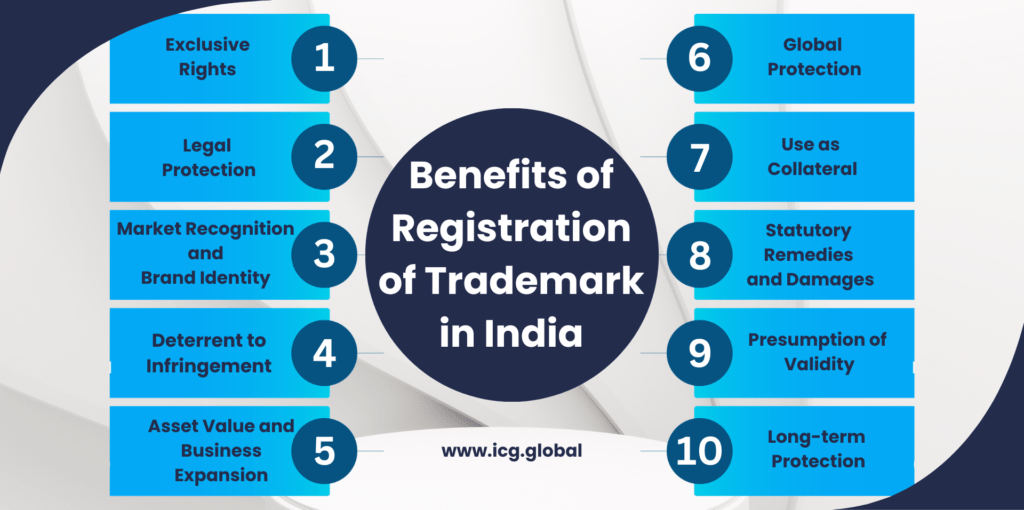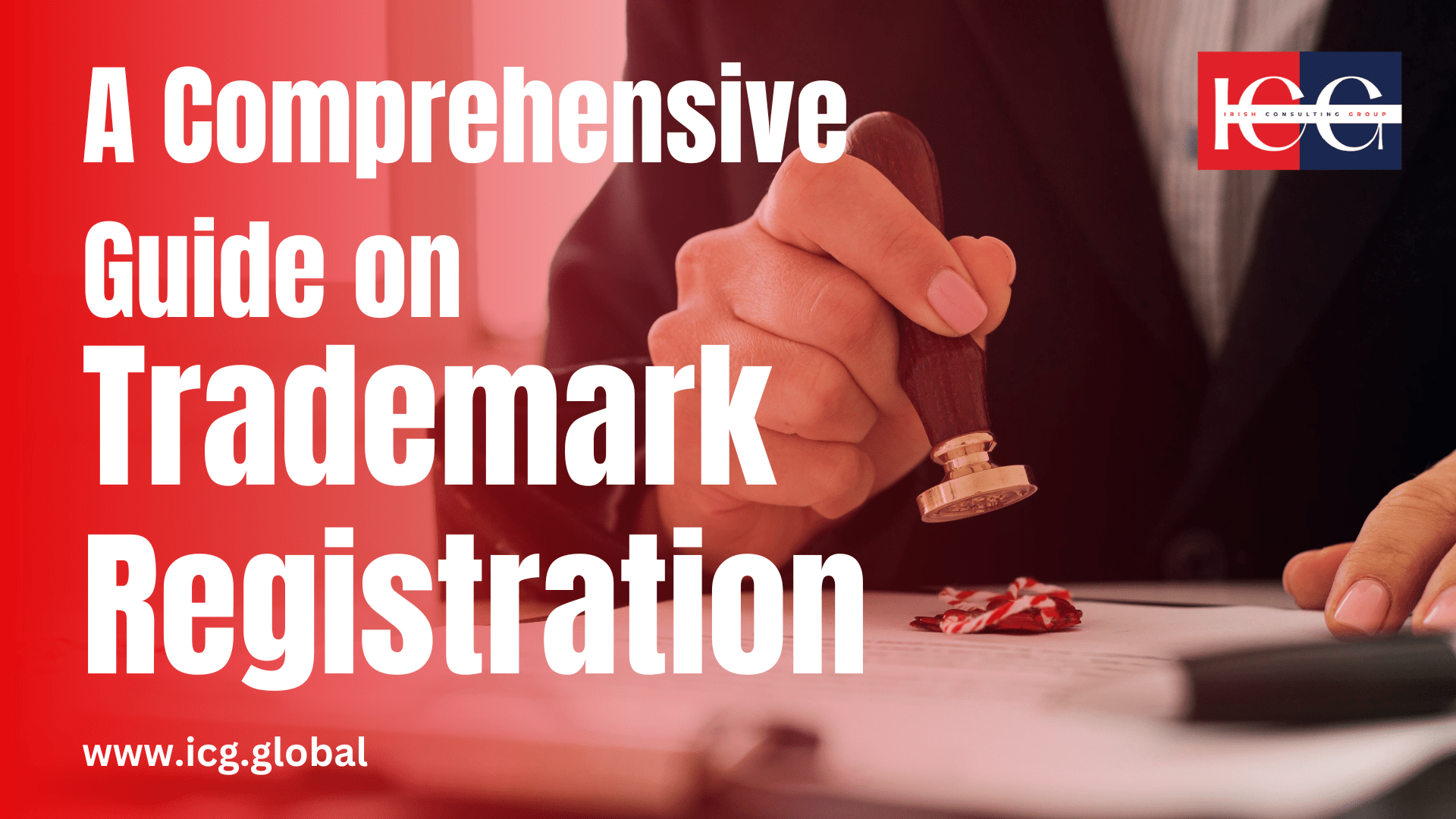A Comprehensive Guide on Trademark Registration
Trademark registration is a crucial step for businesses looking to protect their brand identity and intellectual property. Essentially, a trademark is a symbol, word, or phrase that distinguishes one company’s products or services from those of others. Registering a trademark provides legal protection and exclusive rights over its use, helping to build brand recognition and trust among consumers.
Benefits of Trademark Registration
One of the primary benefits of registering a trademark is legal protection. By doing so, a business gains the exclusive right to use that mark in connection with its goods or services. This protection extends nationwide, providing a strong defense against unauthorized use by competitors.
On top of that, the trademark registration process enhances brand recognition and consumer trust. A registered trademark signals to consumers that a product or service comes from a reputable source, helping to build loyalty and credibility in the marketplace.
Trademark Registration Process
Procedure for registration of trademark
The trademark registration process usually comprises several pivotal stages:
Exploration and Culling of Trademarks:
Before commencing the enrollment process, it is imperative to conduct exhaustive exploration to ascertain the uniqueness of the chosen trademark and its nonexistence in utilization by another entity. This endeavor forestalls potential disputes and augments the probability of a fruitful registration.
Submission of Application:
Upon the selection of a fitting trademark, the subsequent step involves submitting an application to the pertinent trademark office. The application encompasses particulars such as the trademark itself, the commodities or amenities it intends to represent, and the proprietor’s details.
Scrutiny by Trademark Office:
Subsequent to submission, the trademark office scrutinizes the application to ensure its adherence to all statutory prerequisites and its non-confliction with existing trademarks. In the event of any discernible issues, the applicant may need to address them before proceeding further.
Period of Publication and Opposition:
If the trademark application transcends the scrutiny phase, it undergoes publication in a public repository for a stipulated duration. Throughout this interval, third parties possess the opportunity to oppose the registration should they believe it encroaches upon their existing rights.
Dispensation of Certificate:
Provided no opposition is encountered or effectively surmounted, the trademark is formally registered, and a certificate of registration is conferred upon the proprietor. This document serves as official affirmation of the trademark’s legal safeguard and exclusive entitlements.
Trademark Classes
The trademark registration process is divided into different classes, each representing a distinct category of goods or services. It is essential to select the appropriate class(es) for your trademark to ensure comprehensive protection. For example, a trademark for clothing would fall under class 25, whereas a trademark for software would fall under class 42.
Trademark Registration Check
Before you start with the trademark registration process, it is essential to conduct a comprehensive trademark search to ensure that the chosen mark is not already in use by another entity. This search helps to avoid potential conflicts and rejections of the application:
Database Search:
The first step in any trademark investigation is to examine official trademark databases maintained by governments. These archives consist of both active applications and officially registered trademarks. Filtering through these databases makes it easier to find any registered trademarks that are similar to, or exactly match, the one that is being considered for registration.
Common Law Search:
In addition to official databases, a customary law search should be conducted in order to locate unregistered trademarks that could have acquired rights through long-term use in trade. This project involves searching trade directories, commercial publications, and other sources for any unregistered trademarks that might raise infringement issues.
Domain Name Search:
An essential step in the trademark examination procedure is determining whether web domain names linked to the proposed trademark are available. Although the availability of a domain name does not guarantee trademark viability, it can provide additional information about potential conflicts or branding opportunities.
Social Media and Online Platforms:
Monitoring social media sites and online marketplaces can help identify instances where the proposed trademark has been used without authorization or in violation of the law. This includes searching for similar trademarks or brand names that are being used by rival companies or other third parties.
International Search:
It is necessary to carry out searches within relevant international trademark repositories if the trademark is going to be used in several jurisdictions. This can help identify existing registrations or possible conflicts in other countries where the trademark might be used operationally.
Consulting with Trademark Experts:
Obtaining advice from trademark attorneys or specialists may be essential in complex situations or when handling high-stakes trademark disputes. These professionals can provide invaluable insights and counsel based on their expertise and access to specialized databases and resources.
Common Mistakes to Avoid While Registering for a Trademark
One common mistake that happens frequently during the trademark registration process is failing to conduct adequate research before selecting a trademark. This can lead to conflicts with existing trademarks and the rejection of the application. Likewise, choosing a weak or generic trademark can diminish its effectiveness in distinguishing your products or services from those of your competitors.
Trademark Renewal
Registration of a trademark is not indefinite and requires periodic renewal to maintain protection. Typically, trademarks must be renewed every 5-10 years, depending on the jurisdiction. Failure to renew a trademark can result in its expiration and loss of rights.
Trademark Licensing
Trademark licensing allows businesses to grant permission to third parties to use their trademark in exchange for royalties or other benefits. When licensing a trademark, it is crucial to establish clear terms and guidelines to maintain brand consistency and integrity.
Trademark Enforcement VS Trademark Infringement
Enforcing trademark rights is critical to maintaining the integrity of a brand and preventing unauthorized use. Trademark enforcement refers to the actions taken by the trademark owner to protect their rights and prevent unauthorized use of their trademark. Trademark enforcement efforts aim to stop infringement, preserve the integrity of the trademark, and maintain exclusive rights over its use.
On the other hand, trademark infringement occurs when a third party uses a registered trademark without authorization, leading to confusion among consumers. Businesses can take legal action against infringers to protect their trademark rights, including seeking damages and injunctions.
Both measures are equally important in safeguarding the intellectual property rights of the trademark owner in the long-run.
Trademark Monitoring
Regular monitoring of trademarks is essential to identify potential infringements and protect against unauthorized use. Professional consultants provide various tools and services to help businesses monitor their trademarks effectively and take prompt action against infringers.
Trademark Registration Process Cost
The cost of the trademark registration process can vary depending on factors such as the jurisdiction and the number of classes applied for. For small businesses, startups, sole proprietorships, and individuals, the fee could be around ₹4500 per class, and for other enterprises, it can range from ₹9000. In addition to application fees, businesses should budget for ongoing maintenance costs, such as renewal fees and legal expenses.
International Trademark Registration
For businesses operating internationally, it may be beneficial to pursue trademark registration in multiple countries. International registration streamlines the process of obtaining trademark protection across different jurisdictions, reducing costs and administrative burdens.
Why Professional Assistance for Trademark Registration process
Seeking professional assistance for the trademark registration process is not just advisable; it’s absolutely essential. Whether you’re a startup launching a new brand or an established enterprise expanding into new markets, consultants can provide personalized guidance to maximize the effectiveness of your registration strategy and minimize the risk of errors. Here’s how:
Complexity of Trademark Law:
Trademark law is intricate and multifaceted, requiring a deep understanding of its nuances to navigate successfully. Professional consultants specializing in intellectual property law possess the expertise needed to interpret and apply these complex legal principles accurately, ensuring that your trademark registration process is carried out with precision and adherence to all regulatory requirements.
Customization from a strategic standpoint:
Hiring a professional agency can optimize the success of your trademark registration strategy and guarantee that they are adapted to your unique business requirements and goals.
Extensive Trademark Searches:
To determine whether your suggested trademark is available and registrable, qualified consultants carry out extensive trademark searches. Therefore, consultants assist in reducing the possibility of rejection or legal disputes by early detection of possible conflicts with already-registered trademarks.
Minimization of Costly Mistakes:
By identifying potential conflicts with existing trademarks early on, consultants help mitigate the risk of rejection or legal challenges, saving you time, money, and headaches in the long run.
Ongoing Support and Protection:
Beyond the registration phase, consultants offer invaluable assistance in enforcing and defending your trademarks against unauthorized use, ensuring that your brand identity remains secure and your exclusive rights are upheld over time.
When it comes to traversing the intricacies of trademark procedures, consultants are indispensable allies. That’s precisely why, when selecting a consulting firm to handle your trademark needs, it’s essential that you opt for nothing but the best.
Why Choose ICG?

When it comes to aiding enterprises in navigating the trademark registration process, Irish Consulting Group (ICG) provides comprehensive assistance that empowers clients to safeguard their brand identity and intellectual property rights effectively. Here’s how ICG can assist you in the trademark procedures:
Legal Expertise:
With a seasoned team specializing in intellectual property law, particularly trademark registration, ICG is adept at smoothly navigating companies through the registration process, ensuring strict adherence to legal requirements to enhance the likelihood of success.
First Assessment:
Our team of experts initiates the process with a comprehensive assessment to grasp the client’s trademark needs and objectives, delving into branding intricacies, evaluating potential trademarks, and offering valuable advice on the optimal registration path.
Thorough Examination of Trademarks:
Conducting exhaustive trademark inquiries, ICG assesses the viability of proposed trademarks, preventing potential conflicts with existing trademarks to mitigate the risk of rejection or legal disputes.
Compilation of Applications:
Assisting in assembling and submitting trademark applications, we handle the complex task of drafting documentation, gathering evidence, and facilitating seamless submission to relevant authorities.
Scrutiny and Correspondence:
After application submission, our team diligently monitors progress, promptly addressing queries or objections from the trademark office to expedite registration and resolve issues efficiently.
Management of Publication and Opposition:
In the case of trademark application publication, we are committed to meticulously overseeing the process, identifying any opposition, and providing strategic guidance and robust representation to protect client interests.
Timely Dispensation of Certificates:
Upon successful registration, ICG ensures swift issuance of the trademark registration certificate, offering incontrovertible evidence of legal protection and exclusive entitlements.
Ongoing Assistance:
Continuing support includes guidance on trademark maintenance, renewal, and enforcement, involving vigilant monitoring of trademark usage, identification of potential infringements, and initiation of legal measures when necessary.

